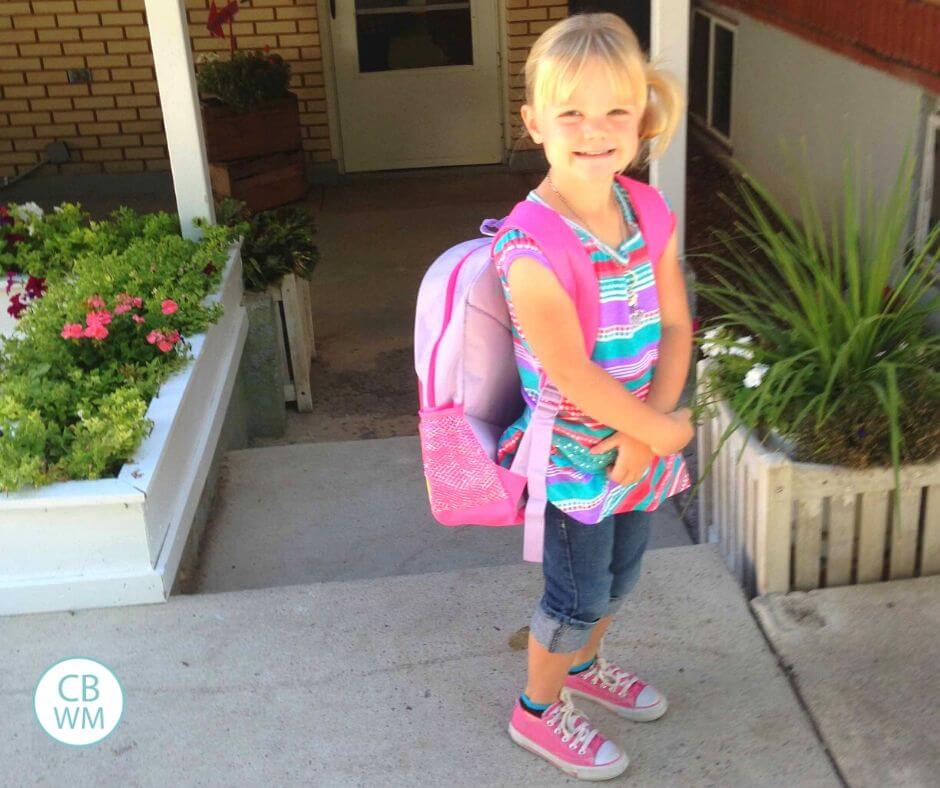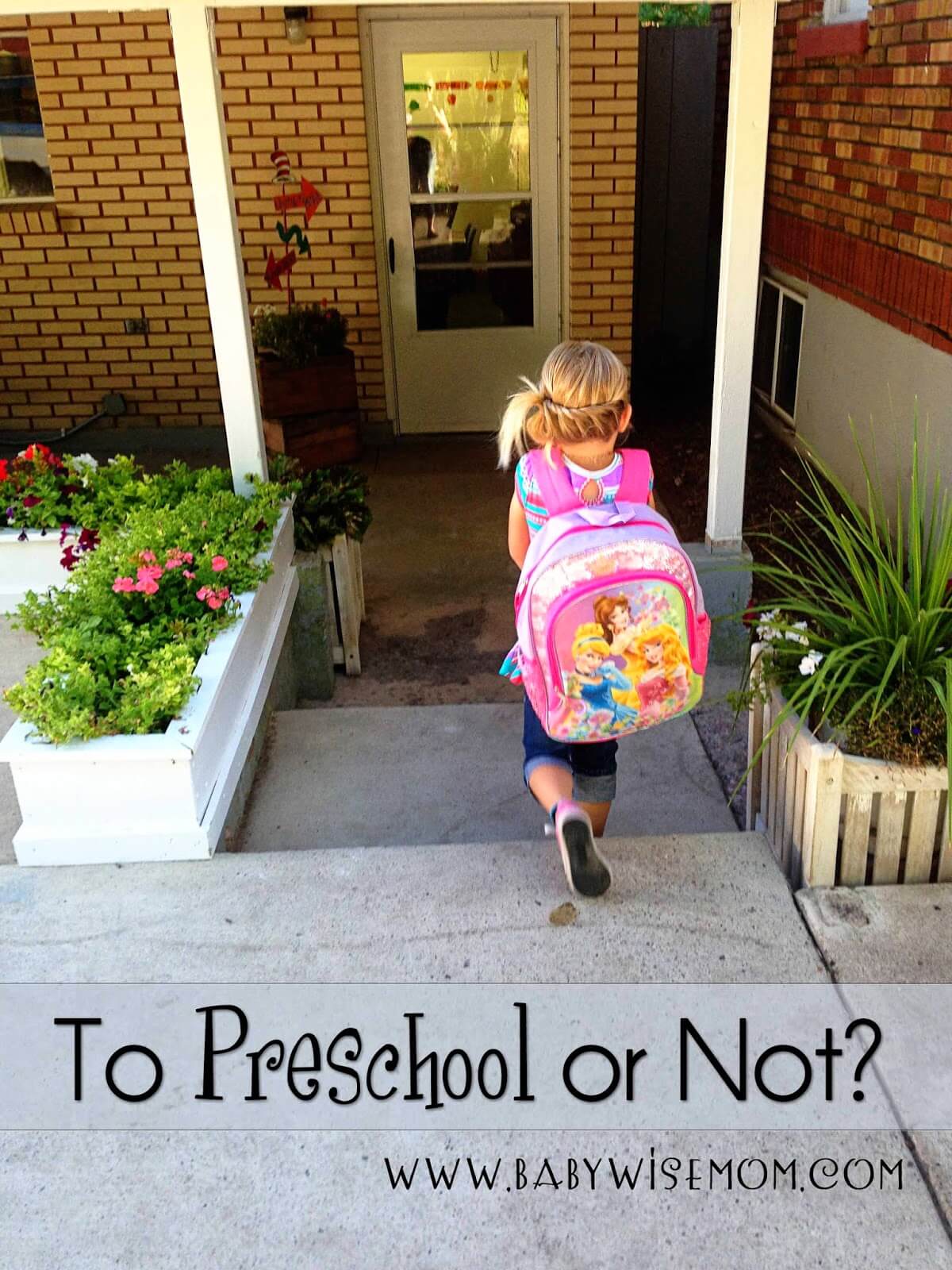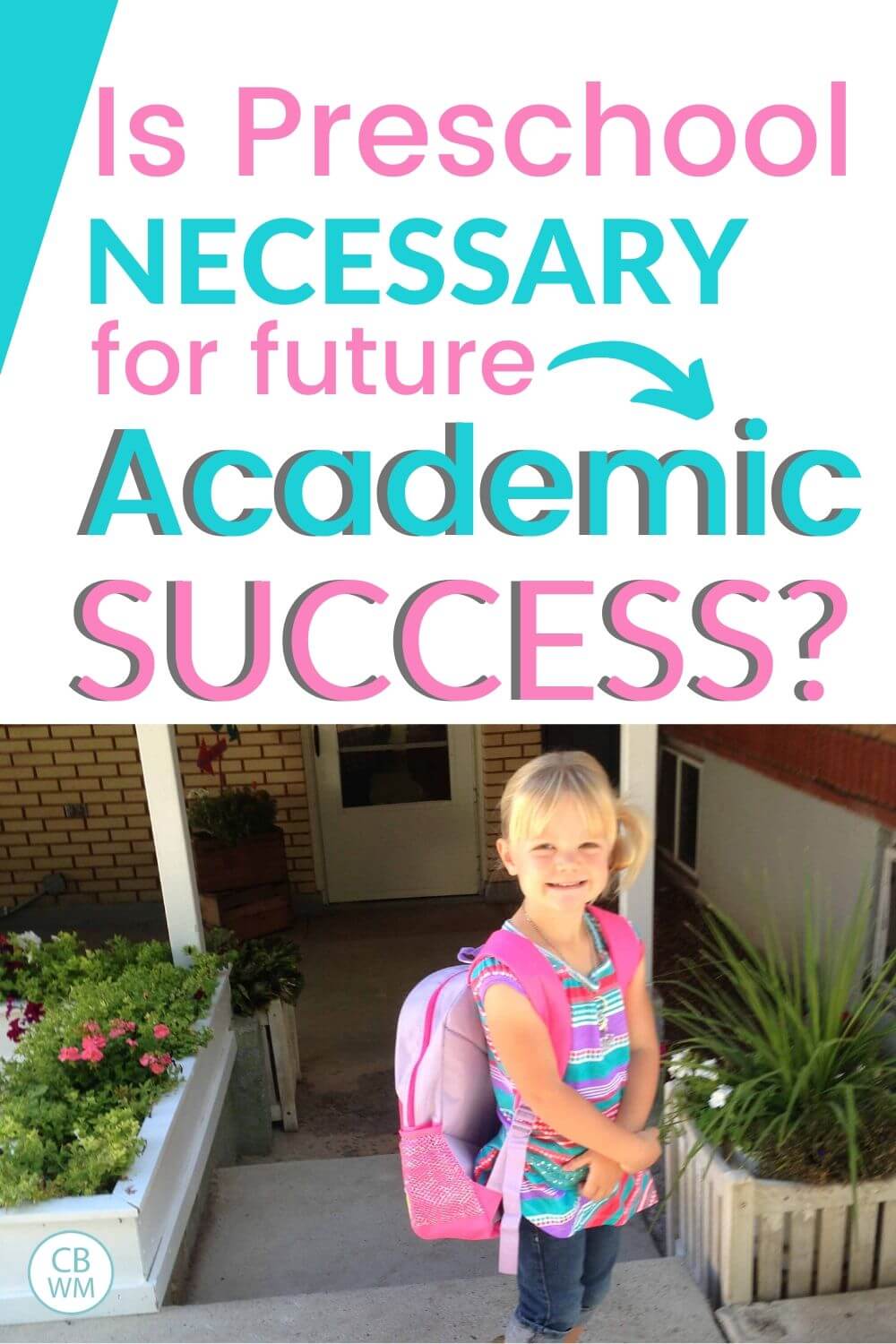Do you need to send your child to preschool to have success in gradeschool? What are the benefits of preschool? What are the drawbacks?

While some parents are excited and anxious for their little one to go to preschool, others do not really want their preschooler to head off to school, whether for convenience, finances, or just wanting to keep their kiddo home longer.
So for those who do not really want to do preschool, they are often left wondering, is it necessary? Will their child be hurt academically or socially if they do not go to preschool?
Post Contents
Preschool is Not Necessary
I don’t think sending your little preschooler to preschool is necessary. My mom didn’t send me, and I think my life turned out great. So as one who has not been there, I can say it is not a necessity.
I think a parent can quite easily teach a child everything she needs to know to be ready for kindergarten academically right from home.
Read: 15 Things Your Child Needs to Know Before Kindergarten
You can set up a preschool homeschool (I talk about how to do a preschool homeschool in this post). You can take things a little easier and do a simple learning activity of the day each day and still reach great dividends (read all about how we did a learning activity of the day here).
You can also prepare for the social aspect through various activities like small playgroups, large playgroups, playing with the neighbors, sports, and most especially church primary if you do that.
—>>>Read all about how to organize a playgroup here.

Preschool Does Have Benefits
That is not to say nothing is gained from preschool. Your child could and would learn a whole lot–and not just academically.
Studies suggest all gains made in preschool, however, are lost by about second grade. By second grade, most students find themselves on a more even playing field.
So if you are worried that your child will be behind because he didn’t go to preschool, he might be, at least for the first couple of years of school. But your child will catch up by second grade.
But on the flip side, there is the whole idea of “first impressions.” Your child only gets one shot at a first impression at school. On Becoming Preschoolwise talks about this in conjunction with being sure your child is ready for school.
If your child is not ready for school, or is ready but is behind other students, it can set your child up for difficulty throughout her academic career. That first impression might tell him he is not as smart as the other kids, and while that may be erroneous, it is still the impression made.
Does that sound dramatic? I can tell you it does not to me in the least. I have seen that happen. I believe preschool can set your child up at a better shot for success in kindergarten.
I also think a preschool teacher can better help you to know if your child is ready for kindergarten or not, which is very valuable to those children with later birthdays. Two of my kids have later birthdays, and I found the insight from preschool teachers invaluable to sending my kids on time with confidence.
Our Preschool Experience
At our house, we did just one year of preschool with each child. We did our learning activity of the day as mentioned above. That grew into a preschool homeschool as the child got older. We did a playgroup with neighborhood kids.
But the year before kindergarten, we did preschool.
With that out of the way, let me share a bit about our preschool experience here.
Brayden
With Brayden, I was able to spend a lot of time one on one with him. Kaitlyn was an easy baby and a big sleeper. We had lots of time available to us, and really needed that structured learning time each day to get us both through with some sanity.
Along came McKenna, who also was an easy baby and great sleeper. I continued being able to work with him.
Brayden also has fun neighbors and friends to play with, along with great learning opportunities in church for learning to sit quietly, raise his hand, walk, stand in line, etc.
With all of his experiences, there was no real need for preschool on any level. Never-the-less, he goes to preschool.
We started him when he was 4–his last year before kindergarten. I really must say that I am amazed at how much he learned at school. He only went three days a week for 2.5 hours at a time.
But there was something about the environment that led to him learning so much more than he did at home. He pretty much had the best preschool teacher on the planet–I am sure that something to do with it :).
I really only hoped to have him gain a better grasp on the social aspects of school, and he gained so much more. At his kindergarten screening, he scored a perfect score.
The kindergarten teacher, who has been teaching there for about as long as I have been alive, was very shocked and impressed with him. After the test, she asked me about what else he already knows and was impressed.
Now, I didn’t just send Brayden off to preschool and ignore all academic learning at home.
I noted things he needed help with and we worked on them at home. One day I was talking to his teacher and she expressed that she hopes moms are happy with what their children are learning there.
The funny thing is that struck me as an odd comment. It never really occurred to me to expect her to teach him things. Like I said, my hopes for preschool were all on a social level. I also didn’t expect her to teach my child everything he needed to know in life–that is not her job in my eyes (even though she did it). So I kind of have a different view on what is to be gained from preschool than perhaps others do.
Kaitlyn
Kaitlyn had the same preschool teacher and loved it! She had a great experience at preschool that was very similar to Brayden.
McKenna
McKenna also had the same preschool teacher and loved it. She really enjoyed the social aspect of preschool and had a lot of fun making new friends and playing with them outside of preschool.
Brinley
When Brinley went to preschool, the teacher we had loved so much had moved on to teaching in the elementary school. She had a different teacher. She LOVED preschool and LOVED her teacher.
Brinley has a late summer birthday, so she is one who I really wanted to get preschool teacher input from on if she would be ready to go to school on time or if I should keep her back a year.
As a teacher, she saw preschoolers year after year. She saw how Brinley compared to other children who would be attending preschool the next year.
She assured me Brinley was ready, we sent her on time, and we have never once second-guessed that decision.
Read more on why we sent Brinley to Kindergarten on time here.

Caveats to Preschool
Despite my love for preschool, there are some caveats to my declaration that preschool is worth it on many levels.
One is the age of my child. You may have noticed that my children were quite old when they go to their first year of preschool. In many parts of the United States, children go to “preschool” starting at age two. My opinion is that is uneccessary.
Some do preschool because both parents work outside the home, and that makes sense. Others do need some early intervention and get that in a preschool setting. That also make sense.
But for most kids, I would say you don’t need YEARS of preschool to get the benefits of preschool.
The age is a pretty easy decision for me. It is easy to worry your child will fall behind when you see others around you sending their kiddos to preschool at a young age.
In my area, most parents don’t send their kids to preschools or any sort of organized sport until age three at the earliest (other than perhaps swimming lessons). Most don’t until age four. There isn’t some written rule we all follow, it is just what we do. When I ask moms about it, I get comments about moms wanting to keep their child home with them for as long as they can.
This isn’t some inability to cut the apron strings. The moms around me are highly concerned with moral values. They want their children armed with the ability to make moral decisions correctly before sending them off unsupervised. Yes, a teacher is present, but you cannot expect a teacher to be able to control every word and conversation said in the classroom.
This ties into another caveat of mine, and that is the environment. If there were no preschools and teachers around where I could trust the environment, I wouldn’t send my children at all.
Yes, a teacher can’t control everything, but she can try and she can pass on those same values you hold dear to your children. Most kids love their teachers.
Hearing the teacher say, “you get what you get and you don’t throw a fit” is another authority figure in your child’s life teaching about accepting what you are given (don’t you love that phrase?).
I was able to trust our preschool teachers. There were times a child of mine came home and said something I didn’t like. It wasn’t ever profanity or anything, just whining words or calling a sibling a “goose.”
Because of the years at home with our moral training and because of his age and ability to understand moral reasoning, I can tell him we don’t say that word or call people names and that is the end of it.
This age of four is a great time to work on this with your child.
Remember that moral comprehension really starts around the age of three. Up until three, you have been teaching correct actions without much explanation.
Based on the maturity of your child, somewhere around three you start to add moral reasoning. Instead of just “we don’t pick the flowers,” we add in “we don’t pick the flowers because they aren’t ours” or “because other people want to be able to look at them, too.” So you now have a year or more to apply the “why” behind your “hows” with your child.
So by age four, your child is ready to step out of the home without mom hovering over him for short periods of time. He can practice what he has learned.
He can test the waters while the stakes are low and while he still cares about what mom has to say. At age four, mom is still cooler than a classmate. Mom is still the smartest person around and still has the final word.
With that in mind, I still don’t want to send them at age three. I remember when Kaitlyn was three. Kaitlyn was ready and greatly desired to go to school just like Brayden.
She could have gone at three; our teacher did a three year old class.
Kaitlyn was very smart and very socially capable. I wanted to send her because she would love it. But I felt very strongly that I need to keep her with me that extra year to continue teaching her these morals.
I wanted her to be one year stronger on her moral front when I send her out there. I think a three year old is still tender. A four year old is much stronger in that regard.
With that said, just because it was the best call for Kaitlyn won’t mean it is the best call for your little one, so decide what is best for your child.
Conclusion
So there are my rambling thoughts on preschool. These are some things for you to think over in application with your own children.
Always go with your “gut.” You know your children best and you are able to physically visit the preschool and get the vibe there.
There are always unseen and unknown factors, which is why you need to trust your instincts on what to do. One of my best friends started her little one in preschool as a 2.5 year old and she is one of the most morally straight on people I know. So it might be great for your little one.
On the flip side, no preschool at all might be great for your little one. I never went to preschool and I did very well in school.
In the end, do what is right for your individual child and family.
